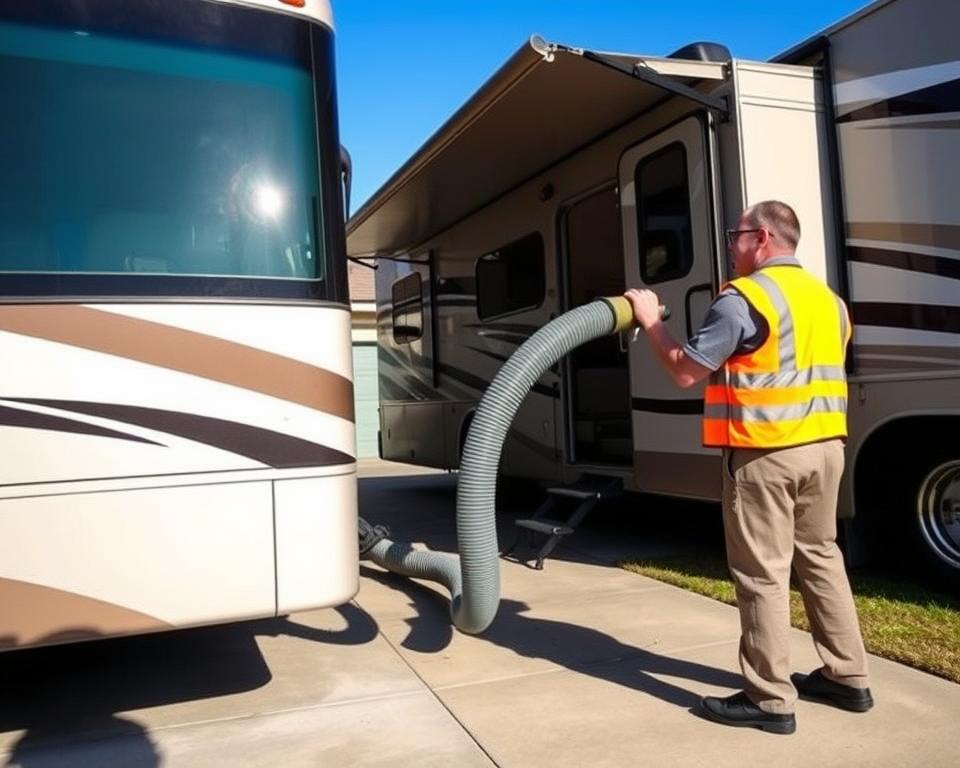RV Sewage Pump: Key Care Advice
Is your RV’s black water pump really ready for the road, or might it lead to camping woes? Preserving your motorhome’s waste system in prime condition is essential. It prevents unpleasant aromas, obstructions, and pricey harm. Here are indispensable advice to ensure your sewage pump operates without a hitch, keeping your travels stress-free.
Getting to Know Your RV’s Plumbing System
The RV plumbing system is crucial for any hassle-free adventure. It divides into two main parts: the black water system and the gray water system – RV septic tank service. The black water system gathers waste from the toilet, while the gray water system manages wastewater from sinks and showers.
The systems utilize drain lines that lead to different tanks, designed for efficient waste management. Each tank has a vent to block gas from building up, keeping the operation is safe and pleasant. Proper waste management in an RV is critical to prevent leaks or bad odors. By knowing both black and gray water tanks, RV owners can upkeep and manage waste better.
Knowing how your RV’s plumbing works helps spot issues in advance. Regular maintenance keeps journeys easier for everyone. Taking initiative with your RV’s plumbing system secures reliability during your travels.
Types of Tanks
Exploring RVs involves understanding the different tanks. Each one is key to your RV’s function, calling for regular upkeep.
The fresh water tank stores cook-and-drink water. It’s essential for a comfortable RV experience.
The gray water tank holds sink, shower, and other non-Septic wastewater. Maintaining this tank keeps your RV fresh while traveling. The black water tank, on the other hand, contains toilet waste. It needs frequent emptying and careful maintenance to avoid issues.
By being familiar with the fresh, gray, and black water tanks, RV owners can optimally control their systems. This planning and steady maintenance deliver smooth functionality of the waste management system.
How RV Black Water Tanks Work
The working of the black water tank is essential in RV waste management. It receives waste from the toilet via a gravity-fed system. Upon flushing, waste and water are sent into the tank, to be stored until removal is necessary. It’s paramount to keep water levels optimized in the toilet to stop solid waste buildup.
Grasping how RV waste tanks function can circumvent clogs and odors. Without proper care, solid waste hardens, creating blockages and emptying difficulties. Comprehensive tank flushing techniques are essential to preventing these issues, guaranteeing smooth functionality.
Routine inspection of tank mechanics is advised for RV owners. This includes observing flushing methods and sustaining adequate water flow. Practicing these essentials facilitates efficient tank maintenance, dodging expensive fixes later.

Vital Maintenance Tips for Your RV Black Water Pump
Carrying out regular maintenance on your RV’s black water pump is critical. Kick off by using RV-safe toilet paper to reduce clogs and better flow. A thorough flush can eliminate waste and reduce bad smells. Routinely cleaning the tank helps prevent residue buildup, ensuring your RV clean and comfortable.
Run frequent inspections to check your pump’s condition. Inspect for any signs of wear or damage that could impair its function. Using specialized tank treatments, like those from All in Sanitation, can markedly raise both performance and cleanliness. Sticking to these tips can increase your pump’s life and upgrade your RV’s living conditions.
Select Camper-Safe Toilet Paper
Keeping your RV’s black water system includes vital steps. One key strategy is using RV-safe toilet paper for clog prevention. This specialized product breaks down quickly in water, tailored for RV sanitation systems.
RV-safe toilet paper is vital for tank maintenance. It dissolves fast, stopping blockages from slow-decomposing materials. This enhances waste disposal efficiency and keeps the plumbing free-flowing.
Pick brands designated as RV-safe when buying toilet paper. These products diminish clog risks and increase your black water tank‘s lifespan by avoiding buildup. Steady use guarantees a stress-free camping experience, void of plumbing troubles.
Flush the Tank Thoroughly
Deep-flushing your black water tank is essential for responsible waste management in your RV. To assist waste movement, ensure the toilet bowl is filled with enough water before flushing. Many RVs are equipped with built-in tank flush systems to make the process more streamlined. For RVs without this feature, employing tank rinsers that attach to the sewer outlet offers a solid alternative.
Correct tank flushing facilitates waste removal and wards off solid accumulations and bad smells. Adhering to this process delivers your RV stays pleasant, making your travels more comfortable. A focus on regular and complete tank flushing will improve hygiene and the overall condition of your RV’s plumbing system.
Stop Residue via Frequent Cleaning
Keeping your RV’s black water tank clean is key for its best function. Routine cleaning eliminates lingering waste inside the tank walls. This means washing well with water and using specific RV tank cleaners for tough deposits.
By cleaning diligently, you avoid odors and minimize clog risks. A properly cleaned tank makes RVing better and helps your plumbing last longer. Build tank maintenance into your routine to deliver smooth travels.
Using the Right Chemicals for RV Black Water Pump Maintenance
Opting for proper chemicals for RV black water pump maintenance is critical for managing waste and controlling smells. Many RV enthusiasts favor enzyme-based RV holding tank treatments. These products employ good bacteria to break down solids and curb bad odors.
Shunning harsh chemicals is essential to prevent damage to your plumbing. Such substances can eat away at pipes, leading to costly fixes and diminishing your RV enjoyment. Applying safe chemicals for odor control secures your tank and pump’s longevity.
Keeping your RV black water tank in top condition enhances your travel experience. Using the right holding tank treatment routinely guarantees your system works well.
Timely Tank Emptying
It’s important to empty your RV’s black water tank at the correct moment for efficient waste removal. Make it a goal to empty when the tank is about two-thirds full is sensible. This avoids solid waste buildup, providing a cleaner emptying process.
Emptying at official stations is imperative for safe, eco-friendly waste handling. It’s vital to monitor the tank‘s levels closely. Letting it fill completely can result in clogs and make disposal more difficult.
Appropriate scheduling and techniques are key for hygienic waste management and can extend your plumbing’s life. Keeping a regular check and doing proper upkeep delivers a pleasant RV living experience.
Seal Inspection and Upkeep
Checking seals around the toilet and tank is important for leak prevention. Over time, these seals might degrade, leading to odors and potential harm. A comprehensive inspection will identify any wear or damage. Catching issues early enables quick replacement to ensure a secure connection and odor-free RV.
Leaving a bit of water in the toilet bowl aids in preserving seal condition. This preventative measure is essential in RV seal upkeep. It extends the seals’ life, stopping leaks and foul odors.
Consistent seal maintenance can stop pricey work later. By focusing on seal health, RV owners ensure a pleasant journey.
Extra Strategies for Ongoing Upkeep
Setting up professional servicing for your RV at least once a year is wise, particularly for black water tank care. This strategy assists with early problem detection and protects your plumbing system’s integrity.
When setting your RV for storage, fully clean and empty the black water tank first. Consider antifreeze to prevent damage from remaining water during cold seasons. Employing this tactic is critical for maintaining the system, ensuring it’s ready for your next adventure.
Frequent audits and preventive actions are vital to increasing your sanitation system’s life. Paying close attention to connections, hoses, and seals ensures smooth operations. This mindset enhances your RV experience, making it enjoyable all year round.
Securing your RV’s black water pump is well-maintained is crucial for a stress-free camping journey. By adhering to the maintenance tips shared, you can retain your black water system operating flawlessly. It’s essential to focus on consistent tidying, using correct flushing methods, and picking appropriate chemicals for waste management.
By meeting these maintenance requirements, you will eliminate unpleasant odors and blockages. This also increases your RV plumbing system’s durability. Proactive care of the RV black water pump yields more time enjoying the outdoors, free from potential setbacks.
Bear in mind, proper upkeep is key next time you gear up for an outing. It’s not the highlight of RV ownership, yet it significantly betters your travel experience.


